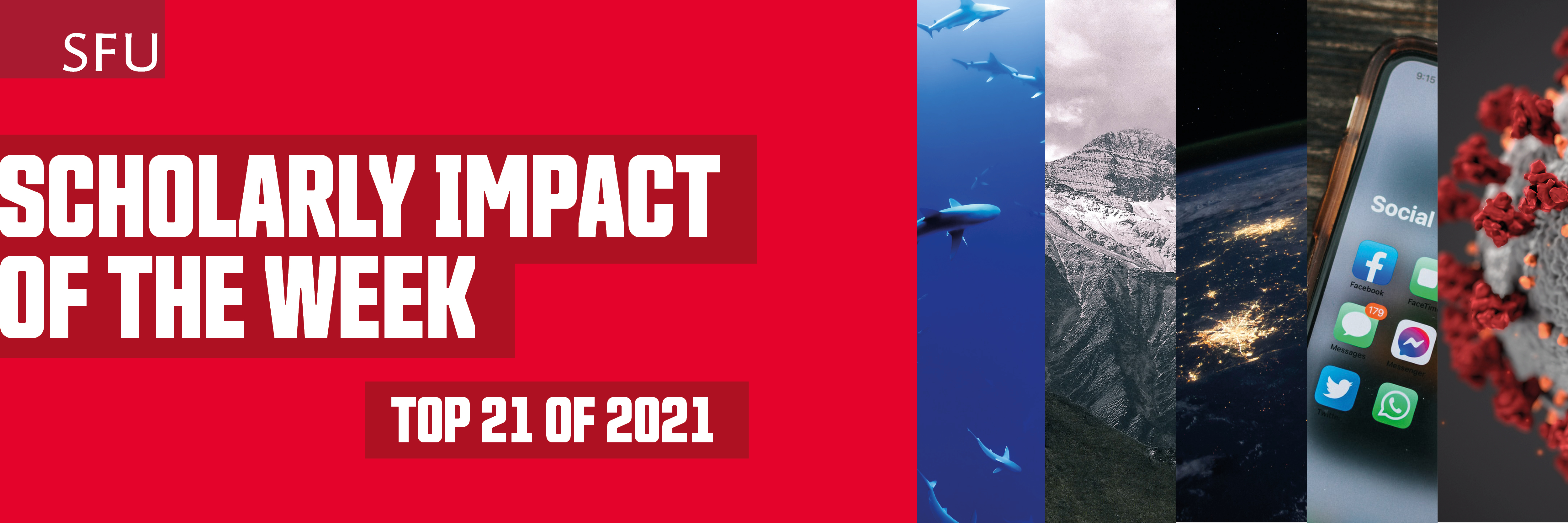
Established in March 2021, Simon Fraser University’s Scholarly Impact of the Week series has featured the work of more than three dozen SFU researchers from all eight faculties. The goal of the series is to raise the profile of our researchers, celebrate their work and mobilize their research impact. Thank you to all the faculty members and staff who helped us do that.
Throughout this eventful year, SFU scholars have made breakthrough scientific and technological discoveries that have transformed their disciplines, benefitted our communities, and broadened our understanding of the planet. They have kept us safe and informed during the COVID-19 pandemic, enlightened us about the world and our place within it and advanced crucial social justice initiatives. Whatever their expertise, SFU researchers contribute valuable knowledge about a complex and changing world.
Thank you to all who participated in the Scholarly Impact of the Week series in 2021. We cannot wait to feature more cutting-edge, enlightening and meaningful research activities in 2022. We wish our entire SFU community a wonderful upcoming holiday season with their loved ones.
Our weekly impact series featured significant career achievements such as those made by SFU scholars Pavol Hell, Stephen Holdcroft and James Wakeling. It highlighted the value of knowledge gathered from the past through works by Henry Daniel, Dana Lepofsky and Celeste Snowber. It pondered the origins of the universe with Levon Pogosian.
Researchers like Laya Behbehani, Alanaise Goodwill, Boydan Nosyk and Travis Salway published important evidence-based studies on how to build more equitable and just societies. Experts like Caroline Colijn worked behind the scenes and in the media to keep the public informed about the pandemic. Two of our scholars, Rekha Krishnan and Alissa Antle had their work featured in The Conversation Canada, one of the world’s most trusted independent sources of news and views from the academic and research community, delivered directly to the public.
We have highlighted below just some of the scholarly works that topped the Altmetric attention scores and the top cited academic papers from SFU. Here is a snapshot of the top 21 publications of 2021—in both the traditional and Altmetric top-cited rating systems.
Please note: These data were pulled December 1, 2021 and do not reflect work published later this year.
SFU's top-cited articles of 2021
On average, SFU researchers publish 2,500 journal articles per year, over 40% of which appear in the world's top 10% journals. The 2021 top-cited articles look at the field-weighted citation impact which considers the differences in research behaviour across disciplines.
According to Scopus, fields such as medicine and biochemistry typically produce more output with more co-authors and longer reference lists than researchers working in the social sciences. This is a reflection of research culture, and not research performance. The methodology of field-weighted citation impact accounts for these disciplinary differences.
A field-weighted citation impact of 1 means that the output performed as expected within the global average for that discipline, while more than 1 means that the output is more cited than expected. For example, 1.48 means 48% more cited than expected. Based on this ranking, SFU scholars remain authoritative voices across all disciplines and in a range of fundamental, interdisciplinary and applied research areas.
* Please note: SFU faculty scholars listed do not include all contributors to each publication. Many of these publications include SFU students and non-SFU authors as well. To view the full list of authors, please visit the link to each article.
** The international ATLAS collaboration publishes a large number of highly cited papers each year, four of which have made our top 21. SFU faculty members Matthias Danninger, Bernd Stelzer and Michel Vetterli are members of this collaboration and authors of these papers. In addition to the paper at number 5, papers published by the ATLAS collaboration also ranked 15, 16 and 20.
Altmetric: What made headlines and caught our attention
It is safe to say that SFU research made waves in 2021, with our scholars and their work enjoying a consistent media presence. SFU marine biodiversity and conservation professor Nick Dulvy’s paper on shark populations went viral this past year, logging over 4000 media mentions, including close to 1800 specifically over Twitter. At last count, professor and Canada Research Chair Caroline Colijn was mentioned globally in the media 3000 times; her article on COVID transmission in schools was one of her most-shared works.
SFU uses the Altmetric database to capture metrics and qualitative data that are complementary to traditional, citation-based metrics. Altmetric scores pull data from traditional and social media, from sources all over the world.
Altmetric’s attention score represents a weighted count of mentions in traditional and nontraditional media platforms for a specific research output.
We encourage the SFU research community to engage with us and submit an Impact idea for 2022.